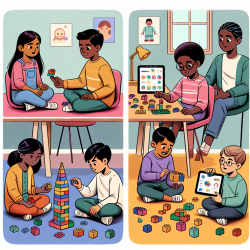Introduction
As practitioners dedicated to improving the lives of children with autism, we are constantly on the lookout for innovative, evidence-based interventions that can make a real difference. One such promising approach is LEGO-based therapy, a child-oriented intervention designed to enhance social skills and reduce isolation among children with Autism Spectrum Disorder (ASD). This blog will explore the findings from the research article "Investigating SOcial Competence and Isolation in children with Autism taking part in LEGO-based therapy clubs In School Environments (I-SOCIALISE): study protocol" and how you can leverage these insights to improve your practice.
Understanding LEGO-Based Therapy
LEGO-based therapy is a group-based social skills intervention that takes place in educational settings. It uses collaborative LEGO play to motivate children with ASD to engage in shared learning experiences with their peers. The structured nature of LEGO play aligns well with the preferences of many children with ASD, making it an effective tool for fostering social interactions.
Key Findings from the I-SOCIALISE Study
The I-SOCIALISE study is a multicentre, pragmatic, cluster randomized controlled trial (RCT) that aims to evaluate the effectiveness of LEGO-based therapy in improving social competence and reducing perceived social isolation among children with ASD. Here are some key findings:
- Social Skills Improvement: The primary outcome measure, the social skills subscale of the Social Skills Improvement System (SSIS), showed significant improvements in children participating in LEGO-based therapy compared to those receiving usual care.
- Perceived Social Isolation: Children in the LEGO-based therapy group reported reduced feelings of social isolation, as measured by the Multidimensional Scale of Perceived Social Support and the Asher Loneliness Scale.
- Cost-Effectiveness: The study also aims to evaluate the cost-effectiveness of LEGO-based therapy, providing valuable insights for schools and policymakers.
Implementing LEGO-Based Therapy in Your Practice
Based on the findings of the I-SOCIALISE study, here are some steps you can take to incorporate LEGO-based therapy into your practice:
- Training: Ensure that practitioners are trained in LEGO-based therapy techniques. This includes understanding the principles of collaborative play and how to facilitate group sessions effectively.
- Group Formation: Form groups of three children, including at least one child with ASD. This setup encourages peer interaction and provides opportunities for social learning.
- Session Structure: Conduct weekly sessions lasting 45-60 minutes over a period of 12 weeks. Use the structured nature of LEGO play to guide interactions and encourage cooperative play.
- Monitor Progress: Use tools like the SSIS to assess improvements in social skills and adjust the intervention as needed.
Encouraging Further Research
While the I-SOCIALISE study provides promising evidence for the effectiveness of LEGO-based therapy, further research is needed to explore its long-term impact and cost-effectiveness. Practitioners are encouraged to contribute to this growing body of knowledge by conducting their own studies and sharing findings with the broader community.
To read the original research paper, please follow this link: Investigating SOcial Competence and Isolation in children with Autism taking part in LEGO-based therapy clubs In School Environments (I-SOCIALISE): study protocol.










